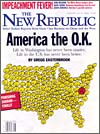
New Republic, Jan. 4 and 11
(posted Friday, Dec. 18, 1998)
The triumphal cover story marshals an army of statistics to prove that "life in the U.S. has never been better." Crime, accidents, fires, drinking, smoking, drugging, air pollution, water pollution, racism, and divorce are declining. We live longer, happier, wealthier lives than ever before. Credit American pragmatism: We really can fix our problems if we try. ... An article says impeachment-crazed Rep. Bob Barr, R-Ga., lied about his association with the racist Council of Concerned Citizens. Barr, despite his claims to the contrary, spent a long time at the group's conference, never denounced its views, and knew about its loathsome ideology when he spoke to it. ... The editorial says the Iraq bombing proves America's strength, not its weakness: "In the middle of the greatest political excruciation in its modern history, the United States is doing the noble and necessary thing."
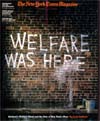
New York Times Magazine, Dec. 20
(posted Thursday, Dec. 17, 1998)
An ambivalent cover story describes New York City's massive welfare-to-work program. Mayor Rudolph Giuliani's reforms have taken 400,000 people off the rolls, prevented thousands more from getting on, and placed 30,000 in workfare jobs, but no one knows if those who've left welfare are in better shape than they were when they received public assistance. Giuliani's new ambition--to make all welfare recipients work--seems fraught: There are too many sick and otherwise disabled recipients who will resist. ... The magazine profiles Craig Rosebraugh, the spokesman for Earth Liberation Front, the radical animal rights group that burned down a Vail ski resort in October. Rosebraugh doesn't even belong to the group or know who its members are, but he preaches their eco-sabotage gospel. Much excellent detail about the lives of serious animal activists: They use the word "species-ist" in earnest. ... A piece gushes over "the anti-Trump," New York real estate developer Jerry Speyer, who owns the Chrysler Building. His low-key, civic-minded style has made him perhaps the most powerful developer in the world.
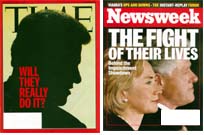
Time and Newsweek, Dec. 21 (posted Tuesday, Dec. 15, 1998)
Impeachment covers for both. Time rehashes last week's hearings, votes, and speeches. Newsweek's "The Fight of Their Lives" focuses on the Clinton marriage, which is even rockier than usual: Hillary is pursuing her own activist agenda rather than helping Bill fight scandal. Newsweek claims that Bob Dole and Howard Baker have been asked to mediate between the White House and congressional Republicans but have not accepted. The White House is also hoping for a last minute intervention by former President George Bush. Both magazines list House members who are fence-sitting the impeachment vote.
Newsweek interviews Serbian leader Slobodan Milosevic, who's as repellent as you'd expect. He says Serbians were "doing our best to stop [the Bosnian war]," that Serbians never massacred Bosnians, and that Serbia's main problem in the United States is "bad P.R." ... A photo essay depicts disabled Russian children in gruesome asylums. ... An article claims that racial animus is contributing to the NBA strike. Black players feel that white owners don't respect them and are treating them as ghetto thugs who don't deserve their high salaries.
A Time investigative piece suggests that Osama Bin Laden may seek revenge on the United States by attacking Washington or New York with bombs or chemical weapons. ...Time picks the best entertainment of the year: Saving Private Ryan, A Man in Full, Mark McGwire, the final episode of The Larry Sanders Show, and The Miseducation of Lauryn Hill.
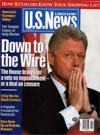
U.S. News & World Report, Dec. 21 (posted Tuesday, Dec. 15, 1998)
Its impeachment cover package also chronicles last week's furor and lists the undecideds. Two Watergate vets opine: Charles W. Colson says impeach him; John Dean says don't, because Congress has been too partisan and unfair. ... A story says the Pentagon has concluded that the Chinese government gained much valuable ballistic missile technology by launching U.S. satellites on its rockets. American companies have claimed that the launches helped the United States more than China. These satellite launches are at the heart of the Loral campaign finance inquiry.
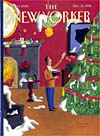
The New Yorker, Dec. 21 (posted Tuesday, Dec. 15, 1998)
A long profile of Bob Hope depicts him as the first corporate comic. He employed armies of comedians to write his jokes, made early promotional deals with networks and advertisers, and worked assiduously to build the Hope brand. His great comic gifts: natural ease, a breezy all-American persona, and speed. He didn't tell the best jokes, but he told the most. (His vault has 585,000 jokes in it.) Hope, who's 95 and fading, was also a vain womanizer. ... A piece mocks Hollywood's gift culture, where flowers are an insult and $300 shoes are merely adequate. ... An article tries to rehabilitate ex-Lewinsky lawyer William Ginsburg, applauding his clumsy efforts to protect Monica. It was under his successors, after all, that Monica was subjected to degrading questioning by Kenneth Starr's staff. Even so, Ginsburg is described by a colleague as "an ego with a digestive system."
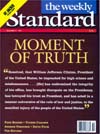
Weekly Standard, Dec. 21 (posted Tuesday, Dec. 15, 1998)
A piece explicitly argues what Republicans have been hinting: Impeachment by the House is censure. ... An article applauds a Minnesota school district for offering pro-abstinence sex-education classes. Parents can choose between the traditional sex-ed curriculum and the new abstinence one. The American Civil Liberties Union may sue to block the new classes.
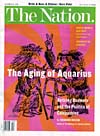
The Nation, Dec. 28 (posted Tuesday, Dec. 15, 1998)
The cover story urges government action to harness the talents of retiring baby boomers. The boomers should be urged to be active volunteers, teachers, caregivers, etc., and the federal government should correspondingly raise Social Security payments.
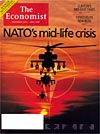
Economist, Dec. 12 (posted Saturday, Dec. 12, 1998)
The cover editorial, pegged to NATO's 50th anniversary, warns that the military organization is shaky. With the Soviet threat gone, NATO needs to address broader future challenges, such as ethnic conflict and germ warfare. This will only happen if European members spend more on defense and rely less on the United States. ... A piece notes that the West is subsidizing critical Russian infrastructure, including its nuclear programs, schools, and libraries. The crippled Russian government has no choice but to accept this aid, but it's disturbingly reminiscent of 19th century colonialism. ... An essay tries to explain why everyone hates the French. Americans mock the Frogs because we envy their intellectual arrogance, history, and glamour. There is also universal scorn for their "fashion-bound intellocracy," though the Economist concedes that not all French intellectuals are "jargon-spouting frauds."

Vanity Fair, January 1999 (posted Saturday, Dec. 12, 1998)
The most alarmist Y2K story yet. In addition to the usual list of catastrophes (power outages, plane crashes, etc.), it foresees 10 million to 300 million deaths from food shortages and accidental nuclear missile launches. It also berates everyone, from early programmers to IBM to Microsoft to the Clinton administration, for lackadaisical response. Y2K could destroy Al Gore's 2000 presidential campaign. Weirdest detail: Mobsters are bribing Y2K debuggers to rig computers to funnel money into their accounts. ... A profile of Susan McDougal says she's manipulative and awful beneath her sweet front. She refuses to testify to Kenneth Starr not because she wants to protect the president but because she's afraid of being charged with perjury herself.
